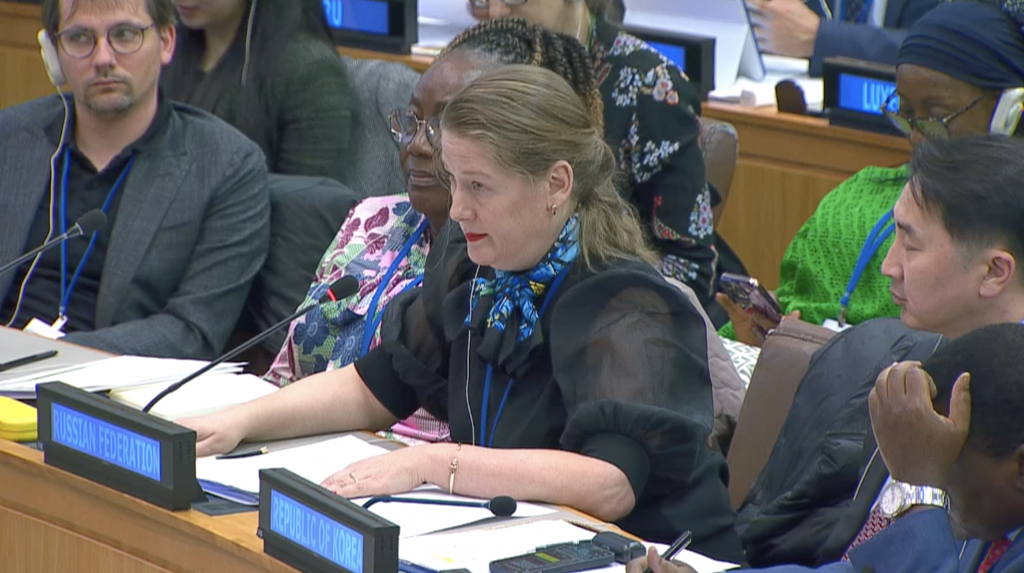Statement by Deputy Permanent Representative Maria Zabolotskaya at an "Arria-formula" meeting of UNSC members “Leveraging the synergies between the CEDAW and the Women, Peace and Security Framework”
Mr.President,
Women are among the main victims of an armed conflict or crisis situation. Besides, women are usually the ones who provide care and assistance to children, the elderly and the disabled. Crisis situations multiply the vulnerability of these persons, and therefore of women too. Thus, women have a direct interest in preventing and resolving armed conflicts, preventing and investigating cases of violence against women and children. Increasing the role of women in these processes enables, among other things, the establishment of more sustainable and trust-based relations with the local population, facilitating effective follow-up measures for the rehabilitation and reintegration of victims.
Russia attaches great importance to Security Council’s WPS agenda. At the same time, however, we are convinced that its successful promotion requires that the Council's efforts be focused on the main aspect - the protection of women, and also on their role in preventing and resolving armed conflicts.
We disagree with attempts to universalize this issue at the Security Council. UNSC cannot and should not address the advancement of women’s status across all fields and outside situations of armed conflict. Not every crisis situation poses a threat to international peace and security and calls for intervention by the Security Council.
The UN has a diverse system of bodies that are designed to promote women's protection and empowerment. That includes the Committee on the Elimination of Discrimination against Women (CEDAW), the UN Commission on the Status of Women, UN Women. Each of them contributes in their own way. The UN Human Rights Council, the Peacebuilding Commission, and the General Assembly also make a contribution. It is important to observe the existing "division of labor" in the Organization, without duplicating the efforts and authorities of its bodies.
We believe that national action plans for the implementation of resolution 1325 on WPS should be developed on a voluntary basis by states in armed conflict or at the stage of post-conflict recovery. In the same context, we do not support the use of imprecise terminology, such as "conflict-related sexual violence". Such terminology takes us away from sexual violence committed precisely in the context of an armed conflict, which is what the Security Council is mandated to address under resolution 1820 (2008). This issue is part of a broader problem associated with attempts to equate crimes against women in armed conflict with similar incidents in peacetime. In the context of armed conflict, it is crucial to observe international humanitarian law. But invoking IHL in other situations would not be correct. In situations of armed conflict, it is also crucial to distinguish between sexual violence as a war crime and similar criminal offences unrelated to actions of the warring parties.
As for the Committee on the Elimination of Discrimination against Women (CEDAW), it is a treaty body established by the Convention on the Elimination of All Forms of Discrimination against Women, to which Russia has been a party since its inception. CEDAW has the important responsibility of reviewing the implementation of the provisions of the Convention by its states parties. Sometimes the Committee adopts recommendations of a general nature, which is not provided for in the Convention. Therefore, such recommendations are expert opinions and cannot impose additional obligations on states, i.a. by means of introducing new terminology.
CEDAW does not have the authority to consider WPS agenda, and the Security Council does not have the authority to monitor the implementation of the Convention. And we do not see this as a problem. On the contrary, these bodies, within the framework of their respective mandates and specific working methods, each in their own way make an important contribution to the protection and empowerment of women in different situations.
The Russian Federation remains committed to its obligations under both the Convention on the Elimination of All Forms of Discrimination against Women and UN Security Council decisions on "Women, Peace, Security".
We are convinced that it is important to carry out this work without politicization and without false accusations. It is important that each country should work to deliver on its relevant commitments. For example, I would like to recommend to the representative of France, Ms. Bergé, to consider prosecuting French soldiers who committed sexual crimes in Africa and who remain unpunished, rather than to repeat here some unfounded accusations against other countries.
Thank you.
